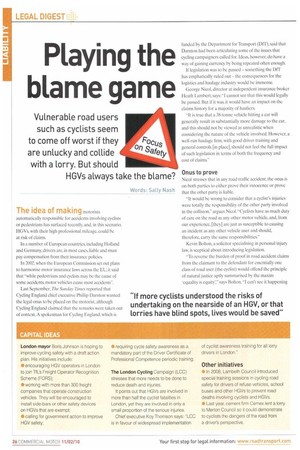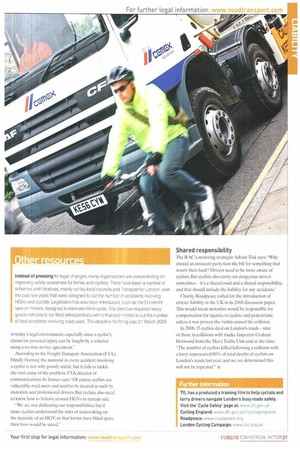Playing the blame game
Page 26

Page 27

If you've noticed an error in this article please click here to report it so we can fix it.
Vulnerable road users such as cyclists seem to come off worst if they are unlucky and collide with a lorry. But should HGVs always take the blame?
The idea of making motorists
automatically responsible for accidents involving cyclists or pedestrians has surfaced recently, and, in this scenario, HGVs, with their high professional mileage, could be at risk of claims.
In a number of European countries, including Holland and Germany, drivers are, in most cases, liable and must pay compensation from their insurance policies.
In 2002. when the European Commission set out plans to harmonise motor insurance laws across the EU, it said that "while pedestrians and cyclists may be the cause of some accidents, motor vehicles cause most accidents".
Last September, The Sunday Times reported that Cycling England chief executive Phillip Darman wanted the legal onus to be placed on the motorist, although Cycling England claimed that the remarks were taken out of context. A spokesman for Cycling England. which is funded by the Department for Transport (Df I), said that Darnion had been articulating some of the issues that cycling campaigners called for. Ideas, however, do have a way of gaining currency by being repeated often enough.
If legislation was to be passed — something the DfT has emphatically ruled out — the consequences for the logistics and haulage industry would be immense.
George Nicol, director at independent insurance broker Heath Lambert, says: "I cannot see that this would legally be passed. But if it was, it would have an impact on the claims history for a majority of hauliers.
-It is true that a 38-tonne vehicle hitting a car will generally result in substantially more damage to the car, and this should not be viewed as unrealistic when considering the nature of the vehicle involved. However, a well-run haulage firm, with good driver training and general controls [in place], should not feel the full impact of such legislation in terms of both the frequency and cost of claims."
Onus to prove
Nicol stresses that in any road traffic accident, the onus is on both parties to either prove their innocence or prove that the other party is liable.
"It would be wrong to consider that a cyclist's injuries were totally the responsibility of the other party involved in the collision," argues Nicol. "Cyclists have as much duty of care on the road as any other motor vehicle, and, from our experience, [they] are just as susceptible to causing an incident as any other vehicle user and should, therefore, carry the same responsibilities."
Kevin Bolton, a solicitor specialising in personal injury law, is sceptical about introducing legislation.
"To reverse the burden of proof in road accident claims from the claimant to the defendant for essentially one class of road user (the cyclist) would offend the principle of natural justice aptly summarised by the maxim 'equality is equity'," says Bolton. "I can't see it happening
in today's legal environment, especially since a cyclist's claims for personal injury can be fought by a solicitor using a no-win, no-fee agreement."
According to the Freight Transport Association (ED), blindly blaming the motorist in every accident involving a cyclist is not only grossly unfair, but it fails to tackle the root cause of the problem. ETA director of communications Jo Tanner says: "Of course cyclists are vulnerable road users and need to be treated as such by motorists and professional drivers. But cyclists also need to know how to behave around HG Vs to remain safe.
"We are not abdicating our responsibilities, but if more cyclists understood the risks of undertaking on the nearside of an HGV, or that lorries have blind spots. then lives would be saved."
Shared responsibility
The RAC's motoring strategist Adrian Tink says:"Why should an innocent party foot the bill for something that wasn't their fault? Drivers need to be more aware of cyclists. But cyclists also carry out dangerous moves sometimes — it's a shared road and a shared responsibility, and that should include the liability for any accidents."
Charity Roadpeace called for the introduction of stricter liability in the UK in its 2008 discussion paper This would mean motorists would be responsible for compensation for injuries to cyclists and pedestrians, unless it was proven the victim caused the collision.
In 2008,15 cyclists died on London's roads — nine of those in collisions with trucks. Inspector Graham Honvood from the Met's Traffic Unit said at the time: "The number of cyclists killed following a collision with a lorry represented 60"/0 of total deaths of cyclists on London's roads last year, and we are determined this will not he repeated." u




































































































































